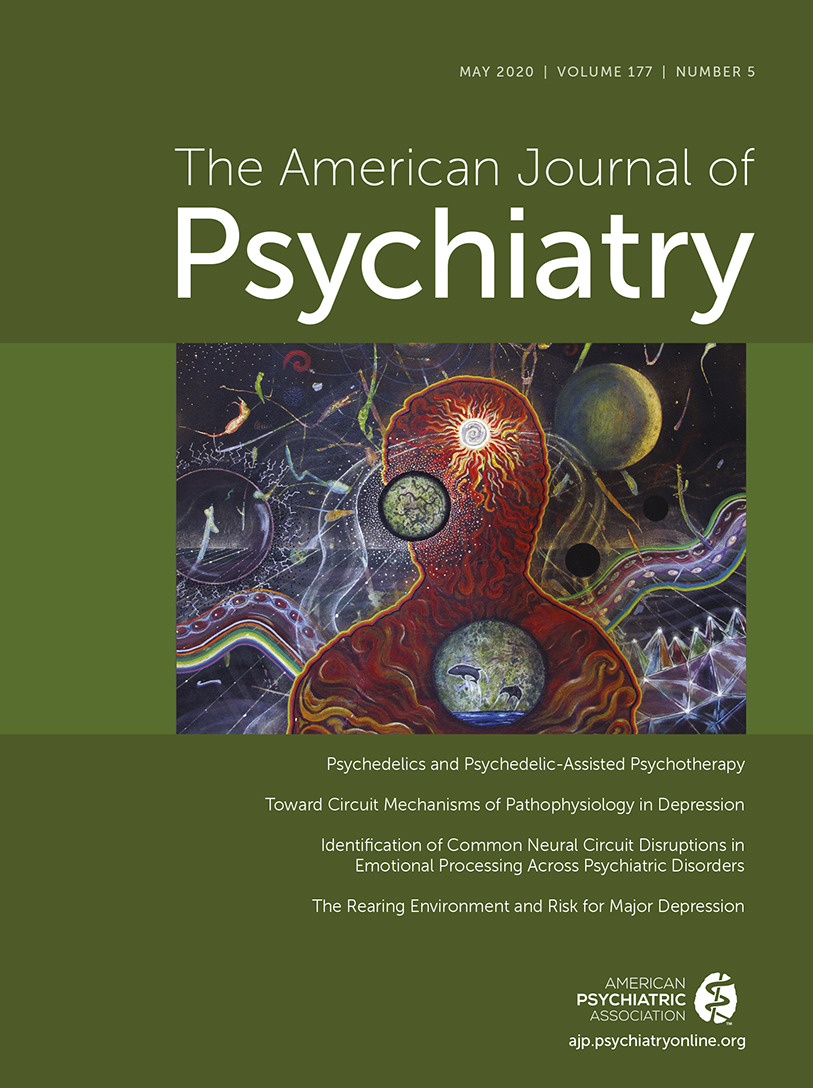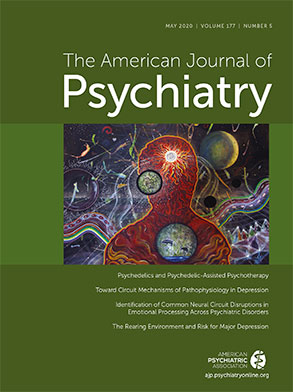The review in this issue by Reiff and colleagues (
1) on psychedelics and psychedelic-assisted psychotherapy from the American Psychiatric Association’s Council of Research is to be commended for its thorough review of studies in the past 12 years in the area. The authors nicely lay out the rationale for reviewing the literature, which is in part based on the recent resurgence of interest and the potential to gain regulatory approval to make these treatments available to patients. Proposed industry studies are likely to yield informative data on the efficacy and safety of these compounds that will ultimately guide their clinical use. In the meantime, a detailed review of the entire area from its historical perspectives through pharmacology/mechanisms of action to clinical benefits and risk of abuse is extremely helpful for the field. This effort is to be lauded and will be of great benefit in informing patients, providers, and researchers, as there are a number of issues relevant to studying and ultimately using these agents.
The treatment of depression and anxiety was greatly helped by the development of safer and more widely effective selective serotonin reuptake inhibitors (SSRIs) in 1988. With that advance, we saw a treatment alternative for a large cadre of patients who had not responded to or could not tolerate the first-generation tricyclic antidepressants or monoamine oxidase inhibitors but who did respond to the SSRIs. The wider safety margin of the SSRIs led to their being applied to patients whose illness was of milder severity, with seemingly considerable benefit. However, studies demonstrate that SSRIs in milder depression actually show less or little advantage over placebo (
2), and the seeming benefit of wider-scale application may have somewhat, and erroneously, overreached. Still, as demonstrated in the Sequenced Treatment Alternatives to Relieve Depression (STAR*D) study (
3,
4), the majority of patients with depression do not experience remission on an SSRI (i.e., they do not even show a placebo response to antidepressants) and seem to require other treatments that are also of limited benefit. The assumption has been that we need more effective somatic treatments, but that may not be entirely correct.
We have had an ever-growing population of patients whose illness is seemingly refractory to standard therapies, but the solution to the problem is a rational system for determining whether patients require any treatment, and if so, what type. The interest in newer somatic treatments in part reflects a sense of near desperation in treating this group of patients, many of whom may actually not be particularly responsive to somatic therapy. The numbers of patients whose symptoms do not respond to antidepressants may also have been boosted by a relatively wide definition of the diagnosis of major depression, with its broad diagnostic criteria. These criteria have led to relatively high current and lifetime prevalence rates for major depression—as high as 10% and 20%, respectively (
5).
This background is not discussed in the Reiff et al. review but should be considered important as we turn to using psychedelics to help patients. Psilocybin is now in phase 2 studies for refractory depression, but, to date, the blinded data that spurred this effort have come from advanced-stage cancer patients with significant anxiety and depression (
6,
7). In those patients, the psychedelic experience appeared to have a long-term benefit, but does that really tell us something regarding the use of psilocybin in refractory major depression? The open-label series of non-cancer patients with refractory depression by Carhart-Harris et al. (
8) is suggestive of potential benefit, but its value is questionable because it is not a controlled study. So do we have much to go on to apply for the treatment of refractory depression? Indeed, perhaps with psilocybin we will see little improvement in the core symptoms of depression. Based on the cancer studies, we might see improvement in self-awareness, which could be of general benefit but may not translate to improved depressed mood and its core vegetative symptoms. This is a key issue in using these agents to treat clinical syndromes where a sense of enlightenment might be enhanced, as could a patient’s serenity, but not their lack of energy, sleep disturbance, etc. One way to study these drugs and to limit “enlightenment” effects would be to have the therapists provide limited support if needed but otherwise to avoid making interpretations.
Optimal application of these approaches may require advances in other aspects of research on anxiety and depressive disorders. For example, will this treatment be useful in patients with severe refractory depression? Patients with anxious depression? Patients with milder depression who may not be particularly responsive to medication but who may do well on a combination of a psychedelic and some form of therapy? These patients could experience a markedly sustained response, such as that seen in some of the cancer patients reported in the work of Griffiths et al. (
9). It is possible that the pivotal clinical trials that are under way may be targeting the wrong population or the wrong outcome.
A key issue in conducting clinical trials in this area is how to blind the trial. This is a problem in the ketamine and esketamine studies, where using saline as placebo is not adequate for true blinding. Without an appropriate blind, what are we to conclude? It has been a concern of this author that as we move to potential drugs of abuse to help patients, thus shifting the risk-benefit ratio, we do so as we are also moving away from the well-established design features of the randomized controlled trial. How should we deal with this? For one, we should require all sponsors and trials to interrogate the blind. Asking patients and investigators what treatment they believe they were randomized to is simple and straightforward. Second, we need to develop better comparators that mimic the features that tip patients and investigators off to the assignment of the study drug. Of particular importance in relation to this issue is the dissociation that is produced by many of the compounds currently being studied. The field needs a dissociating comparator that is not an antidepressant. Recently, our group (
10) reported that the antidepressant effects of ketamine were blocked by the mu-opioid receptor antagonist naltrexone but the dissociative properties were not. This suggests the possibility that ketamine plus naltrexone could be used as a potential control for studying drugs known to have dissociative effects. From the perspective of this author, the previously used 1 mg of psilocybin as placebo is not likely to ensure the blind when compared with a target dose of 25 mg, even in patients who have been treatment naive to higher doses of psilocybin. One approach is to use a truly blinded rater; that should help, but it is not simple to limit patients’ responses to specific questions to avoid their indicating something about their specific experiences. This remains a knotty problem for the field and it is one that may lead to the approval of medications that some deem to be not particularly effective. Indeed, this has already occurred with the controversial approval of intranasal esketamine (
11).
In certain communities, guided psychotherapy combined with psychedelic agents has become somewhat common, with providers believing the psychedelic treatment helps the patient make faster gains in specific psychotherapies. The medication may be administered several times over a few weeks. That approach is discussed in the Reiff et al. (
1) review, in which it is noted that there are limited data in support of it. Indeed, while the approach could prove beneficial, it is difficult to standardize in a randomized controlled trial. However, it is possible to do it, and for all we know, it may prove to be helpful to some patients. But which ones? That is another question for the field, and when we know that, we can then judge the risk-benefit ratio to individual patients and to society writ large for having these agents generally available. As Reiff et al. indicate, “continued research on the efficacy of psychedelics for the treatment of psychiatric disorders is warranted,” but from this perspective, we need to be sure we are asking the right questions: In which types of patients? How severely ill? “Walking worried” patients with subsyndromal illness, or patients with milder depressive or anxious symptoms? Only if we keep the issues outlined above in mind will we come to rational conclusions regarding the wider applications of these compounds.

